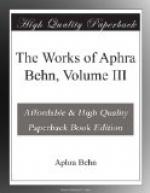p. 186 Valentinian. The reference is to the Earl of Rochester’s Valentinian, altered from Fletcher, which was produced with great applause at the Theatre Royal in 1684. The Court Bawds, Balbus, Proculus, Chylax, Lycinius, with the ’lewd women belonging to the court’, Ardelia and Phorba, are important characters in the tragedy. The direct allusion is, perhaps, to Act ii, I. The scene after the rape, Act iv, sc. III, ’opens, discovers th’Emperor’s Chamber. Lucina newly unbound by th’Emperor’. The ’Prologue spoken by Mrs. Cook the first day’ is by Mrs. Behn (vide Vol. VI). It is certain that an audience which found no offence in Rochester’s Valentinian could ill have taken umbrage at the freedoms of The Lucky Chance.
p. 186 The Moor of Venice. Othello was one of the first plays to be revived at the Restoration, and was, perhaps, the most frequently seen of all Shakespeare. On 11 October, 1660, Burt acted Othello at the Cockpit. Downes gives Mohun as Iago; Hart, Cassio; Cartwright, Brabantio; Beeston, Roderigo; Mrs. Hughes, Desdemona; Mrs. Rutter, Emilia. But it is certain Clun had also acted Iago—(Pepys, 6 February, 1668). Hart soon gave up Cassio to Kynaston for the title role in which he is said to have excelled. After his retirement in 1683 it fell to Betterton, of whose greatness in the part Cibber gives a lively picture. The Tatler also highly commends this actor’s Othello.
p. 186 The Maids Tragedy. Mrs. Behn refers to Act ii, I, and Act iii, I. Hart acted Amintor; Mohun, Melantius; Wintershall, the King; Mrs. Marshall, Evadne. Rymer particularly praises Hart and Mohun in this tragedy, saying: ’There we have our Roscius and Aesopus both on the stage together.’ After 1683 it was differently cast. It will be remembered that Melantius was Betterton’s last role, in which he appeared for his benefit 13 April, 1710, to the Amintor of Wilks and the Evadne of Mrs. Barry. He died 28 April, a fortnight after.
p. 187 Wills Coffee House. This famous coffee-house was No. 1 Bow Street, Covent Garden, on the west side corner of Russell Street. It derived its name from Will Unwin who kept it. The wits’ room was upstairs on the first floor. Some of its reputation was due to the fact that it was a favourite resort of Dryden.
p. 187 write for a Third day only. The whole profits of the third day’s performance went to the author of the play; and upon these occasions his friends and patrons would naturally rally to support him. There are numberless allusions to this custom, especially in Prefaces, Prologues and Epilogues.
p. 189 the Mall. The Mall, St. James’s Park, was formed for Charles II, who was very fond of the game ‘pall-mall’. The walk soon became a popular and fashionable resort. There are innumerable references. cf. Prologue, Dryden’s Marriage a la Mode (1672):—
Poor pensive punk now peeps
ere plays begin,
Sees the bare bench, and dares
not venture in;
But manages her last half-crown
with care,
And trudges to the Mall, on
foot, for air.




